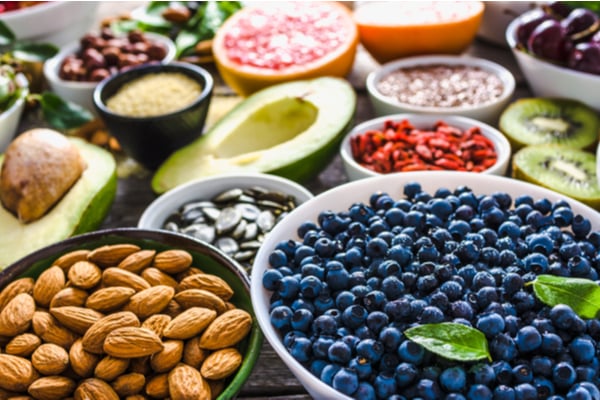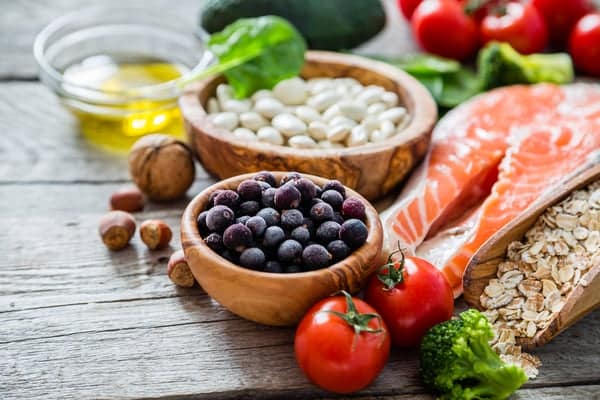In the sports nutrition market, the biggest heavyweight contender has to be protein powder. In fact, protein powders make up nearly 70 percent of the industry’s $16 billion market.
It certainly makes sense why. Athletes need protein to compete and stay in shape. Plus, the human body is made up of about 20 percent protein and doesn’t store any of it. It is a part of every single cell in the human body. Regardless of whether or not someone is an athlete, it’s incredibly important that protein is consumed on a daily basis to stay healthy. The average person needs a minimum of around 55 to 60 grams of protein each day. For those who wish to build muscle or lose weight, those protein needs are going to be much higher.
While whey protein is still the supplement of choice for most people, there is now a growing interest in plant-based protein supplements.
But what exactly is a plant-based protein? Is it safe to recommend plant-based protein supplements to one’s clients? Are plant proteins as good as animal proteins?
In this guide, we’ll be exploring everything personal trainers, coaches, and nutritionists need to know about the growing interest in plant-based supplements.
Let’s start by breaking down the truth behind the term “plant-based.”
What Is a Plant-Based Diet?
A plant-based diet, also known as a plant-forward diet, is a type of diet that focuses mainly on foods that come from plants.
A plant-based diet would be rich in fruits and vegetables, as well as nuts, oils, grains, seeds, legumes, and beans.
It’s important to note that a plant-based diet is not equal to vegetarianism or veganism. Vegetarians eat a plant-based diet but refrain from eating meat, poultry, and fish. Vegans also eat a plant-based diet but refrain from eating any and all animal products such as dairy, eggs, and honey. A plant-based diet simply refers to a diet mainly composed of plant-based products. With this diet, one is choosing most of their foods from plant sources but does not have to solely consume vegetables and fruit.
One popular plant-based diet is the Mediterranean diet, which is rich in vegetables and fruit. Fish, eggs, poultry, and yogurt are also consumed several times a week. Meat and sugary foods are consumed less often. This diet has been linked to a significantly reduced risk of heart disease and diabetes.
So, to put it simply, people are more interested in plant-based diets than they used to be. It’s only natural that plant-based supplements, such as protein, would come into the picture. This is especially so because meat (as scientists currently understand) is the highest quality source of protein, followed by dairy. Vegetables, fruits, grains, and seeds have decent amounts of protein but tend to lack one or more essential amino acids.
So, where can those who want to eat a more heart-healthy, plant-based diet get high-quality protein from without having to eat meat or dairy each and every single day?
This is where plant-based protein supplements come in.
What Are the Benefits of a Plant-Based Protein Supplement?
One of the biggest benefits of plant-based protein supplements is one that we’ve already mentioned—it’s a great way to get that necessary daily protein while on a plant-based diet or while reducing one’s meat and dairy intake. Even though plant-based protein may lack a couple of vital amino acids, it’s still a great supplement to take to stay healthy. And there are even more benefits to plant-based proteins.
Gut Health
Research has shown that people who consume a plant-based diet tend to have a special gut profile, one that contains significantly fewer organisms that cause disease and inflammation. Having a diverse range of microbiomes in one’s gut is linked to fewer instances of fatigue, skin problems, autoimmune disease, depression, and other conditions.
This is more of a “plant-based diet” thing than a “plant-based protein” thing, but it’s worth mentioning for those considering plant-based supplements in general.
Better Absorption
Sprouted plant proteins are very easily absorbed by the human body. By eating sprouted grains, beans, nuts, or seeds, one can digest and absorb the proteins within those foods with more ease. Sprouted plant proteins do quite a good job of repairing muscle tissue as well.
Improved Immune System
Adding some plant-based protein supplements into your daily intake can help your body fight off disease naturally. This is because many types of bean and nut-based foods are rich in fiber, which helps clean out the gut and keep it healthy, leading to less of a risk of cardiovascular disease and even cancer. Medical journals have also discovered that replacing red meat with foods rich in plant-based protein significantly reduces the risk of heart disease.
Healthy Fats
Nut-based proteins contain a decent amount of healthy fats in addition to plant-based protein. Healthy fats can help with balancing hormones, maintaining a healthy appetite, and controlling sugar levels. They’re also quite easy to digest if eaten in the form of nut butters like almond butter, peanut butter, cashew butter, and hazelnut butter. Nut butters are also very delicious, which is a definite plus.
Athletic Performance and Weight Loss
One would assume that all athletes gain their muscle mass through the consumption of copious amounts of protein-rich meat. For those who are trying to build up their strength or muscle mass but want to cut down on how much meat and dairy they consume—you’re in luck. Plant-based proteins have been shown to improve athletes’ performance, energy levels, and ability to recover quickly.
Losing weight can also be made easier by consuming more plant proteins. Fiber-rich plant proteins help dieters feel fuller for longer and can help combat overeating or binge eating as well. Feeling fuller for longer can definitely help in weight loss.
Improved Appetite
Whole plant proteins can help one feel fuller for longer. This is a natural result of adequate protein intake. However, when it comes to plant proteins like beans and legumes, the fiber that naturally occurs in these foods helps keep us fuller for even longer than meat protein would. In fact, a study found that people who consumed plant-based protein-rich meals ate 12 percent fewer calories in their next meal when compared to a meaty protein-rich meal.
Clearly, there are a ton of excellent benefits to adopting a plant-based diet or consuming more plant-based protein. So, what kind of supplements are out there for consumers to try? And what are the real downfalls of plant-based protein supplements?
{{cta(‘6dd1507c-935a-4c96-bdb3-c6966eeeeae8’)}}
6 Types of Plant-Based Protein Supplements
There are twenty amino acids that make up protein compounds. The human body is capable of creating eleven of them naturally, and the remaining nine amino acids must come from one’s diet.
These are typically known as “essential” amino acids. A “complete” protein is one that contains all nine of these amino acids. There are some plant-based foods that contain these amino acids, and they tend to be the main ingredient in plant-based protein supplements.
The only real downside to plant-based protein supplements (that is currently known) is a lack of regulation. The Food and Drug Administration (FDA) does not currently regulate protein powders in general. In 2018, a research study found that many popular protein powder products contained potentially dangerous heavy metals like lead and arsenic. Before recommending a particular product to a client, be sure to do some research on the specific brand and ensure that the client purchases the protein powder from a reputable company.
It’s worth noting that the following six protein types are not the only ones found in plant-based protein supplements. However, they are some of the most popular plants used for protein supplements and powders on the market today.
1. Pea
A newcomer in the protein supplement world, pea protein is a popular plant-based protein source because it contains most of the amino acids needed for complete health. Pea protein also can boost muscle growth, cut down on hunger, and even lower blood pressure.
Pea protein is also a fantastic source of iron. Iron is commonly found in lots of animal-based foods, but it is also found in many different types of plants. While red meat is currently the biggest source of iron for many Western consumers, pea protein contains around 35 percent of the daily recommended amount of iron for an adult. Whey protein supplements of the same volume contain no iron.
2. Hemp
A cannabis sativa variety, hemp is full of protein, though it is not quite as popular or well-known as other ingredients for plant-based protein supplements. Still, this is a great choice for people who have sensitive stomachs, as hemp protein is extremely easy to digest, metabolize, and use.
Hemp also contains tons of omega-3 fatty acids and loads of fiber. This type of plant-based protein is a great choice for those who want to increase their muscle mass while also reaping the benefits of additional nutrients and vitamins.
3. Brown Rice
Brown rice protein powder is a complete protein supplement that contains all of the amino acids that the body needs. Brown rice is very high in fiber and also contains a number of other micronutrients, including calcium, iron, and vitamin C.
Brown rice protein has also been found to help with weight loss and regulating blood sugar. It may also aid in reducing high cholesterol levels that could lead to heart disease. For users who want to improve their overall body composition, brown rice protein powder could be an excellent alternative to animal-based whey protein powder.
4. Soy
One of the most well-known complete plant-based protein sources, soy protein is very high in BCAAs, which supports body strength and muscle growth. Just a half-cup serving of soy protein can pack up to 44 grams of protein. It also contains compounds that are very beneficial to the body, including some that can lower cholesterol in the long-term.
Soy protein has some controversy surrounding its use. While it is a complete protein source, it also contains phytates or antinutrients that can reduce the availability of beneficial zinc and iron in soy. There is also concern over the isoflavones in soy causing hormonal problems, though evidence has shown the effects soy has on thyroid function is minimal to none.
5. Pumpkin Seed
Seed protein powders, especially pumpkin seed protein powders, don’t pack as big of a punch as some of the other more common plant-based protein supplements. A half-cup serving of pumpkin seed protein powder provides somewhere around 36 grams of protein, though this depends on the brand purchased. It also is not a complete protein, as it lacks some of the essential amino acids required by the body (threonine and lysine).
For what it lacks in complete protein, it makes up for in overall nutritiousness. Pumpkin seeds are full of valuable vitamins, including magnesium, iron, zinc, beneficial plant compounds, and other healthy minerals. Some studies have even found that pumpkin seed protein has some anti-inflammatory and antioxidant abilities.
6. Quinoa
It is definitely possible to find quinoa protein supplements, but this seed-based protein is usually mixed with other plant-based protein supplements such as soy or hemp powder. This is because the proteins within the seed are very good at combining with other protein isolates.
Quinoa is technically a complete protein, but when tested as an isolate, the protein within quinoa does not contain all of the nine essential amino acids in high enough concentrations to be considered “complete.” Quinoa protein is only considered a complete protein when it is derived entirely from quinoa and not as an isolate.
Naturally gluten-free, quinoa is a great plant-based protein solution for people with gluten tolerance problems. It is also helpful in improving digestion when combined with other enzymes.
Ingredients to Avoid
As we mentioned previously, do your best to avoid brands or products that contain known amounts of dangerous metals like lead or arsenic. This can be remedied by purchasing products from a reputable brand and seller. It is highly recommended that protein supplements, as well as other products that are consumed, should not be purchased from unfamiliar or unknown websites. Supplement retailers or businesses that specifically specialize in high-quality supplements and vitamins are a great choice.
There are also a number of other ingredients that should be avoided in protein supplements:
- Skim milk powder. Usually added to plant-based protein supplements (as well as other animal-based protein powders) as a cheap filler, skim milk powder is very high in lactose sugars. These sugars can cause constipation and bloating. One way to avoid dairy-based ingredients in a plant-based protein supplement is to look for products that are labeled vegan.
- Casein. This is a whey protein concentrate commonly found in animal-based protein powders but trace amounts may also be found in plant-based protein powders. These protein sources are not well-absorbed by the body and can cause bloating and gut distress in some users.
- Gluten. Even if one does not have a gluten intolerance health issue such as Celiac disease, it isn’t exactly a great ingredient to have in a protein supplement. Too much gluten can cause inflammation and fatigue. If one plans on using a plant-based protein powder to bulk up or build muscle, a product with a lot of gluten could cause some issues. If a grain-based protein must be used, take care to check that additional grain products have not been added as filler.
- Maltodextrin and other dextrins. These can raise one’s glycemic load, meaning that fat storage can occur more quickly. They are common ingredients that are added to protein powders as filler ingredients to make the protein compounds mix easier into a shake or drink.
- Artificial sweeteners. Splenda, aspartame, sucralose, and saccharin may seem like great additives in place of sugar; however, ingesting too much of these fake sweeteners can cause bloating and weight gain.
Helping Your Clients Choose Their Ideal Plant-Based Protein Supplement
There is clearly a wide variety of plant-based protein supplements out there. So, how can one help a client find the right protein powder for them?
First, it’s important to look at the full ingredients list of any product that may be considered. Look out for relevant ingredients that a client could be allergic to.
It’s also important to look at the additional nutritional needs of the client. It has already been established that the client is interested in a plant-based diet or, at the very least, a plant-based protein supplement to take daily. In addition to needing more protein, one may be deficient in iron. In this case, a pea protein supplement could be a great choice. If a client is lacking in fiber, a nut-based protein supplement may be another great solution to try. Additionally, if you suspect heavy metal toxicity or intolerance, consider asking the manufacturer for its heavy metal testing reports.
{{cta(’81eca156-3450-43b6-9153-d14883f49927′)}}



